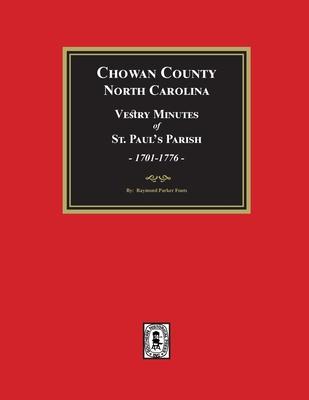By: Raymond Parker Fouts, Pub. 1983, reprinted 2024, 144 pages, (2nd Edition) 8 1/2" x 11" soft cover, ISBN #978-1-63914-176-0. Chowan County was form as a Precinct in 1670. It sits the northeastern portion of the state while be surrounded by the Albemarle Sound and the counties of: Bertie, Hertford, Gates and Perquimans. St. Paul's Parish adjoined the Upper Parish of Nansemond County, VA. After the NC/VA boundary was set in 1782, Chowan County acquired the former Nansemond County lands now lying in Gates County, NC. Chowan County was originally a large source of early migration into the Colony of NC. When the parishes were formed by the General Assembly of NC, the Vestries were assigned some of the civil administrative functions and all such civil functions were official in nature and the records of actions taken were recorded in the vestry books. Such records contained in the Vestry book contained among other things such things as: upkeep of bastard children; payment for the upkeep of the ferry; prosecution of fornicators; appointment of road work crews; apprentice young people to others in the parish for training in crafts or other livelihoods; providing clothing, food and shelter for the poor and elderly; burial of the dead and many, many other similar duties.

Vestry Minutes of St. Paul's Parish, Chowan County, North Carolina, 1701-1776 (2nd Edition)
By: Raymond Parker Fouts, Pub. 1983, reprinted 2024, 144 pages, (2nd Edition) 8 1/2" x 11" soft cover, ISBN #978-1-63914-176-0. Chowan County was form as a Precinct in 1670. It sits the northeastern portion of the state while be surrounded by the Albemarle Sound and the counties of: Bertie, Hertford, Gates and Perquimans. St. Paul's Parish adjoined the Upper Parish of Nansemond County, VA. After the NC/VA boundary was set in 1782, Chowan County acquired the former Nansemond County lands now lying in Gates County, NC. Chowan County was originally a large source of early migration into the Colony of NC. When the parishes were formed by the General Assembly of NC, the Vestries were assigned some of the civil administrative functions and all such civil functions were official in nature and the records of actions taken were recorded in the vestry books. Such records contained in the Vestry book contained among other things such things as: upkeep of bastard children; payment for the upkeep of the ferry; prosecution of fornicators; appointment of road work crews; apprentice young people to others in the parish for training in crafts or other livelihoods; providing clothing, food and shelter for the poor and elderly; burial of the dead and many, many other similar duties.